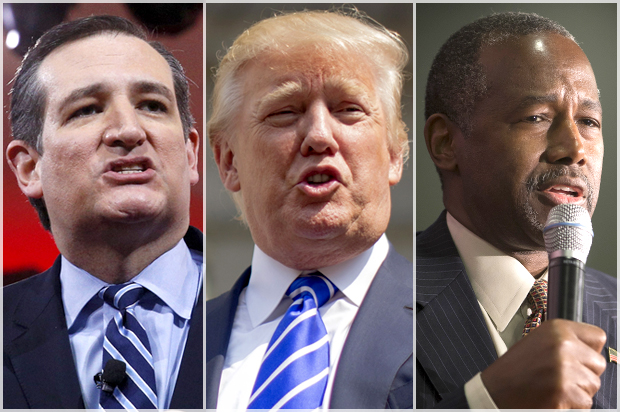While representatives of 14 Republican presidential campaigns met on Sunday night to air their grievances about the primary debates, Reince Priebus must have decided that he had had enough of people whose brains are quickly turning into Jell-O inside their skulls. So he watched football instead.
Yep, that’s just how unconcerned the chairman of the Republican National Committee is with the candidates being in loud and open revolt against details his office has spent months negotiating. It’s all just another small but manageable bump in the long road that is this already interminable campaign. So Priebus’s staff made a point of letting the media know that the Wisconsite was busy watching the Green Bay Packers while the campaigns were drawing up a list of demands for the rest of the 397 scheduled debates their meat suits will agree to endure for democracy.
In truth, I’m betting Priebus and his staff, who were not invited to the debate summit, were keeping a close eye on Twitter, where reports from inside the meeting were being posted just as fast as they could leak. It was a fascinating real-time glimpse of the embattled conservative mindset in 2015, where everyone – the Republican Party, the media – opposes everything they stand for and will stop at nothing to humiliate and destroy their candidates, all but handing the White House over to Hillary Clinton before any votes are cast.
Even before the meeting, the candidates had spent the last few days complaining, threatening to take their balls and go home instead of participating in any more of this allegedly hostile-to-them charade. Priebus had already cancelled one future debate with NBC News as a protest over what Republicans perceived as unfair treatment at the CNBC tilt last week. The candidates, notably Ben Carson, had been all over TV making suggestions for the future: let only conservative media figures like Sean Hannity and Glenn Beck moderate debates, make sure every moderator has voted in at least one Republican primary lest anyone think she has ever allowed even one slight deviation from conservative thought to enter her brain. (Notably, leaks from inside last night’s meeting suggested the campaigns agreed early on to leave Fox News out of any criticism and demands they were aiming at other media outlets that want to host debates.)
The whole display is a disingenuous attempt by the campaigns to have their cake and eat it too, in a way that obscures even legitimate grievances about the debate formats. Because these are not really debates in the sense that they allow candidates to fully articulate positions, to parry and defend themselves while attacking opponents’ positions. Reasoned arguments are nearly impossible with eleven people on stage, each one trying to stand out from the others. These debates are spectacles, entertainment for the masses and excuses for partisans to do some cheerleading.
So sure, the CNBC debate was chaotic. Some of the questions were good, but quite a few were poorly phrased and sounded condescending. The moderators lost control early on, allowing candidates to interrupt and talk over each other, or to filibuster questions they did not like.
That free-form interrupting and bloviating was a particular point of contention for some candidates, notably Dr. Ben Carson, a soft-spoken man who seems constitutionally incapable of participating in the rough-and-tumble scramble for attention that characterizes the debates and much of our political discourse in general. But it actually played to the traits of some of these candidates that their supporters love. Ted Cruz, for example, got to take a perfectly reasonable question about whether blocking every piece of Senate legislation he can means he is not the type of problem-solver America needs, and instead used the time allotted for an answer to excoriate the moderators for being liberal shills. It was a perfect Ted Cruz moment: avoid saying anything of substance to instead bully a bunch of reporters. Doing that on a regular basis is about 90 percent of his appeal.
Watching it unfold, I kept thinking about the modern Republican’s constant need to not be held accountable for his words and actions. A few weeks ago it was the House Freedom Caucus demanding that any new Speaker of the House agree to not punish members in any way for holding the entire nation’s business hostage to their fringe and absolutist positions. In the past it has been complaints about “unfairness” from figures like new House speaker Paul Ryan – or, during CNBC’s debate, Marco Rubio – whenever someone points out the myriad ways in which their policies screw over just about anyone: the middle and working classes, pregnant women who want abortions, people who don’t have affordable health insurance.
In other words, this whole debate brouhaha is the perfect campaign issue for the Republican Party. The candidates don’t like talking about their absurd, unrealistic policies on the issues. Instead they make the fact they are even being questioned about these policies the issue.
These candidates don’t want debates. They want coronations, monuments of hagiography to their own awesomeness. Reince Priebus is stuck with pretending he has any say in any of this. No wonder the man apparently preferred watching football.

